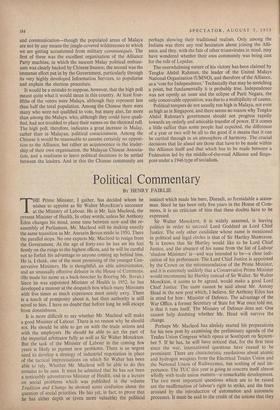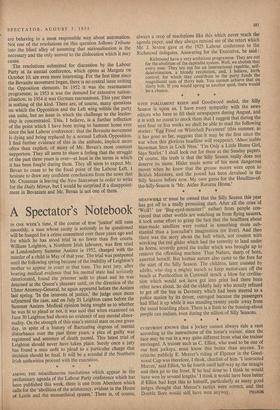Political Commentary
BY HENRY FAIRLIE THE Prime Minister, I gather, has decided whom he wishes to appoint as Sir Walter Monckton's successor at the Ministry of Labour. He is Mr. Iain Macleod, the present Minister of Health. In other words, unless Sir Anthony Eden changes his mind, some time between now and the re- assembly of Parliament, Mr. Macleod will be making exactly the same transition as Mr. Aneurin Bevan made in 1950. There the parallel stops. No one expects Mr. Macleod to resign from the Government. At the age of forty-two he has set his feet firmly on the rungs to the highest offices, and he will be careful not to forfeit his advantage to anyone coming up behind him. He is, I think, one of the most promising of the younger Con- servative Ministers. He is thoughtful, an able administrator, and an unusually effective debater in the House of Commops. (He made his name as a back-bencher by flooring Mr. Bevan.) Since he was appointed Minister of Health in 1952, he has developed a manner at the despatch box which many Ministers with five times as much experience must surely ecvy. There is a touch of pomposity about it, but then authority is still novel to him. I have no doubt' that before long he will escape from donnishness.
It is more difficult to say whether Mr. Macleod will make a good Minister of Labour. There is no reason why he should not. He should be able to get on with the trade unions and with the employers. He should be able to act the part of the impartial arbitrator fully as well as Sir Walter Monckton. But the task of the Minister of Labour in the coming few years is likely to present new problems. There is an urgent need to develop a strategy of industrial negotiation in place of the tactical improvisations on which Sir Walter has been able to rely. Whether Mr. Macleod will be able to do this remains to be seen. It must be admitted that he has not been a noticeably adventurous Minister of Health, and in a lecture on social problems which was published in the volume Tradition and Change he showed some confusion about the question of social priorities. He has yet, in fact, to prove that he has either depth or (even more valuable) the political instinct which made his hero, Disraeli, so formidable a states- man. Since he has been only five years in the House of Com- mons, it is no criticism of him that these doubts have to be expressed.
Sir Walter Monckton, it is widely assumed, is leaving politics in order to succeed Lord Goddard as Lord Chief Justice. The only other candidate whose name is mentioned in political and legal circles is that of Sir Hartley Shawcross. It is known that Sir Hartley would like to be Lord Chief Justice, and the absence of his name from the list of Labour `shadow Ministers' is—and was intended to be—a clear indi- cation of his preferences. The Lord Chief Justice is appointed by the Crown on the recommendation of the Prime Minister, and it is extremely unlikely that a Conservative Prime Minister would recommend Sir Hartley instead of Sir Walter. Sir Walter Monckton, it seems to be agreed, would make a good Lord Chief Justice. The same cannot be said about Mr. Antony Head in the new post which, I believe, Sir Anthony Eden has in mind for him : Minister of Defence. The advantage of the War Office, a former Secretary of State for War once told me, is that it runs itself. The Ministry of Defence does not. One cannot help doubting whether Mr. Head will survive the change.
Perhaps Mr. Macleod has alre'ady started his preparations for his new post by examining the preliminary agenda of the Trades Union Congress which opens at Southport on Septem- ber 5. If he has, he will have noticed that, for the first time since the war, international questions have ceased to be prominent. There are characteristic resolutions about atomic and hydrogen weapons from the Electrical Trades Union and the National Union of Railwaymen, but nothing of real im- portance. The TUC this year is going to concern itself almost wholly with trade union matters—a\ remarkable development. The two most important questions which are to be raised are the reaffirmation of labour's right to strike, and the fears aroused by the introduction of automation and automatic processes. It must be said to the credit of the unions that they are behaving in a most responsible way about automation. Not one of the resolutions on this question follows Tribune into the blind alley of assuming that nationalisation is the necessary and the only answer to the dislocation which it may cause.
The resolutions submitted for discussion by the Labour Party at its annual conference, which opens at Margate on October 10, are even more interesting. For the first time since the Bevanite movement began, there is no central issue uniting the Opposition elements. In 1952 it was the rearmament programme: in 1953 it was the demand for extensive nation- alisation: in 1954 it was German rearmament. This year there is nothing of the kind. There are, of course, many questions on which the Opposition and the Left wing within the party can unite, but no issue in which the challenge to the leader- ship is concentrated. This. I believe, is a further reflection of the point which I have been trying to hammer home ever since the last Labour conference: that the Bevanite movement is dying and being replaced by a normal Leftish Opposition. I find further evidence of this in the attitude, implicit more often than explicit, of many of Mr. Bevan's most constant supporters. They all seem to share a feeling that the struggle of the past three years is over—at least in the terms in which it has been fought during them. They all seem to expect Mr.: Bevan to cease to be the focal point of the Labour Left. I hesitate to draw any confident conclusions from the news that Mr. Crossman is leaving the New Statesman in order to write for the Daily Mirror, but I would be surprised if a disappoint- ment in Bevanism and Mr. Bevan is not one of them.



































 Previous page
Previous page